
Do you ever take some quiet ‘me time’ at the end of a long day to relax and unwind before going to bed?
“Yeah, right!” I hear you say.
“By the time I finish work, look after the kids, sort the house out, and get ready for tomorrow, I barely have enough energy to drag myself to bed.”
It might feel like you’d have to magic a 25th hour in the day out of thin air to have some quality me time. Perhaps you could make time if you wanted to, but just love to binge watch Netflix series, get lost on Instagram, or watch funny cat videos on your phone late into the night.
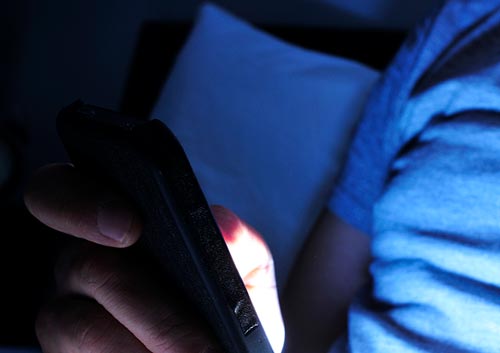
However you currently spend most nights, if you have problems with your sleep, it might help to set aside a little time for a calming activity before jumping into bed. This is a good sleep hygiene technique, and one that works well alongside keeping to a regular sleep schedule.
Personally, I try to spend the last 30 to 60 minutes of the day doing something relaxing; I know from experience that I sleep better when I do. If that seems excessive to you, even focusing on a calming activity for a few minutes is better than trying to instantly transition from racing mind to fast asleep with the flick of a light switch.
How can a bedtime routine help me sleep?
There are a few reasons why repeating the same, or similar, quiet routine at night can help:
- It might help calm an overactive mind if you’re the kind of person who lies awake in bed thinking.
- You can plan for tomorrow so you don’t worry about it in bed.
- By repeating a regular pattern, you can train your body and mind to recognize when it’s time to unwind and prepare for sleep.
- Many activities people do in the evening can be overstimulating. A bedtime routine helps you avoid activities that aren’t so conducive for sleep.
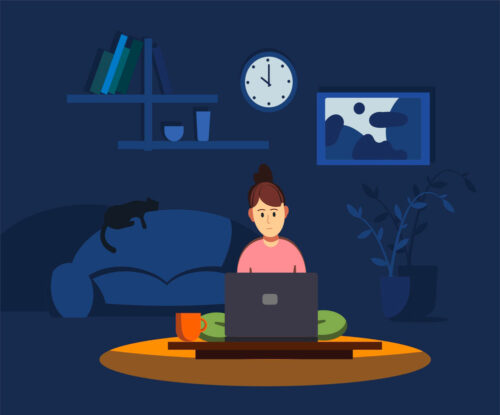
How long should my bedtime routine last?
It’s up to you to decide how long your bedtime routine will last, based on the amount of time you feel it takes you to relax, and how much time you realistically have available.
Your life circumstances will understandably shape the way your routine goes. It may be that by the time you’ve put the kids to bed and collected all the Lego and dinosaurs, or got in from work and wolfed down a late dinner, that 15 minutes is all you feel you have left to yourself.
If you do have more free time and suffer from regular sleep problems, I suggest trying out 30 to 60 minutes of
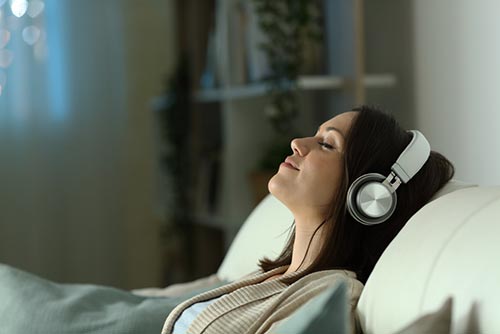
What to do in your bedtime routine
The key is that this should be a quiet, relaxing, and enjoyable time, so the routine will differ from person to person. For some people, just one activity is enough, while others might like to combine two or more.
Let’s take a look at some ideas you could try. What you choose to do is ultimately up to you, but it might be worth experimenting with different ones, or combining them, to see what works for you.
1. Switch off your electronic devices
This first idea is more about what not to do rather than what to do, but I think it’s an important one to consider, no matter how hard giving up your screen time might seem!
Most people love their electronic devices, myself included. Whether it’s television, a computer, tablet, smartphone or games console, they have a way of eroding our precious sleep time though.
It might be best not to stare into a screen during the 30 to 60 minutes before going to sleep for several reasons:
- The content can be mentally, and sometimes emotionally, stimulating.
- The light that some devices emit might affect your internal body clock. If you have to use your phone, at least put the blue light filter or night mode on, and dim the screen brightness.
- They can be addictive, eating into even more sleep time.
- Checking emails, the news and social media at night can create worry and stress. There’s a reason the word ‘doomscrolling’ was invented…
Now, I don’t want to come across as being some kind of party pooper technology police. I know some people feel that watching cute cat videos or playing simple games helps them relax in bed. If doing that genuinely helps you relax and fall asleep, then perhaps that’s okay in small doses (you didn’t hear that from me though).
However, if you have sleep problems and also engage in a lot of screen time, perhaps spend a week without it at night as an experiment and see what happens to your sleep.

2. Do a simple relaxation exercise or meditation before bed
In a survey of 2000 readers of this website, 58% said they couldn’t fall asleep because of their busy mind. Another 24% similarly said it was worry, stress, or anxiety that keeps them up.
If you struggle with this too, try doing a relaxation exercise before you go to bed, or even when you’re already in bed.
Personally, I try to meditate every night before bed, even if it’s just for five or ten minutes. Here’s a little routine I’ve developed that I find relaxing and you can easily squeeze into just a few minutes:
- Dim the lights or light a candle to create some atmosphere.
- Sit cross legged on the floor or lie comfortably.
- Breathe slowly and deeply into your belly five times: in through the nose, out through the mouth.
- Think of three things you’re grateful for today (this is also a great technique to improve your mood).
- Tell yourself that the day is over now. Forgive yourself for any mistakes, bad thoughts or ‘failings’. Forgive others too. Then tell yourself that it’s all in the past.
- Breathe deeply a few more times, mentally following your breath out of your mouth, into the room and beyond (this helps get yourself out of your busy head).
Ideally, I’ll do this routine for the full ten minutes, but I find that even five minutes helps me unwind and feel better before going to sleep. The gratitude and forgiveness practice is particularly good for clearing your head and ending the day on a positive note.
If you’d like some more ideas for relaxation exercises, take a look at the relaxation techniques page.

3. Meditating not your thing? Go for a walk or spend time outside
Meditation and deep breathing aren’t for everyone, and that’s fine. If the previous ideas didn’t appeal to you and you can’t see yourself doing any relaxation exercises, perhaps try going for a little walk outside before you go to bed. Walking in itself can be very relaxing, and it offers an opportunity to clear your mind before going to bed.
If you don’t fancy walking, but have a garden, balcony, or community space, just sitting outside and breathing in some fresh air before going to bed can be relaxing too.
4. Read a book
This is probably my personal favorite of all the techniques as I often fall asleep with the book in my hand. That tells me that either reading works or I have a habit of choosing incredibly boring books. Whatever the case, it’s much more likely to send me to sleep than staring into my phone.
If you have a quiet space to read in the house before going to bed, perhaps with a relaxing drink to accompany it, I’d recommend that too. This is a good idea in the summer or if you’re a hot sleeper – your mattress will feel cooler than if you lie on it for ages while reading before trying to sleep.
I don’t think it really matters whether you read in the living room, bed or garden though. It’s the slowing down and getting lost in the pages that’s the main thing.
I love old-fashioned paper books myself, but Kindles or other screen readers are fine if that’s how you like to read.
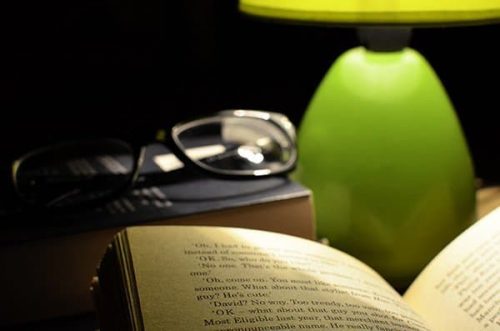
5. Listen to music, a relaxation app or podcast
While it’s good to reduce screen time, listening to music before bed is a great idea. Preferably not music which is too exciting or emotional though.
Everyone loves music, but how often do you take time to do literally nothing but listen to it? For some ideas of calming music across a range of genres, have a listen to my relaxing playlists.
Another idea to try is to listen to a relaxation app or bedtime story podcast. There are many apps to choose from nowadays, so I’ll leave it to you to explore. Just search the app store using phrases like ‘meditation’ or ‘calm stories’.
One suggestion I have though is to search for ‘bedtime stories for adults’ in the Spotify podcasts, YouTube, or whatever player you use. There are a couple of very good ones that are read slowly by calm voices. For example, the Calm sleep story read by Stephen Fry on YouTube currently has 16 million views!
Just remember not to get sucked into using your device if you need to use it to listen to something!
6. Write down your worries and reminders for the next day
Do you sometimes lose sleep because you can’t stop thinking about important tasks you need to remember to do the next day? Sometimes thoughts like these can buzz around in your head, joined by other worries and reminders from your mental to do list.
A simple and effective trick is to write down your worries and points you need to remember for
Here’s one I just did for tomorrow while updating this article. Feel free to analyze my spidery writing!
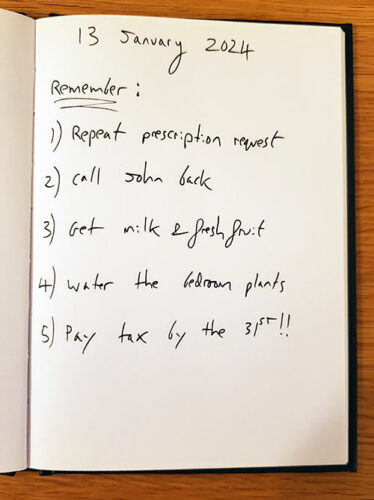
7. Have a relaxing drink or light snack
In my experience, it’s better to avoid caffeine, alcohol, and sugary drinks before bed. But drinking a herbal tea or other decaffeinated drink is a good way to spend some quiet time, perhaps whilst reading or listening to music.
If you feel hungry at night, it’s okay to have a light snack before bed. Just try to keep it healthy and light – a banana, yogurt, cottage cheese on toast, some nuts or berries are good examples.

8. Spiritual practice, prayer or yoga
If you find that engaging in spiritual activity brings you peace and clarity of mind, then doing it before getting into bed is an ideal time.
Whether you enjoy reading spiritual literature, praying, doing light yoga, or meditating, it can be incorporated into your bedtime routine.
9. Keep your bedroom temperature comfortable
It would be great if there was a perfect bedroom temperature that’s guaranteed to help everyone sleep better. The reality, however, is that people have different needs. Some like the bedroom to be cool, while others prefer a warmer temperature.
Some sleep experts recommend that a cooler or moderate bedroom temperature is better for sleep, ideally somewhere between 66° Fahrenheit (19° Celsius) and 70° Fahrenheit (21° Celsius).
While I think this range is a useful starting guideline, it’s perhaps more important to be mindful of the temperature and keep a mental note of whether you sleep better in cooler or warmer conditions.
Personally, temperature is very important to me, so I go out of my way to ensure the temperature is just right in my bedroom. I also do a kind of comfort check when I first get into bed. If I’m uncomfortable because it’s too hot, or the bedding isn’t right, I get up and do something about it rather than lying there hoping I’ll fall asleep anyway.
Here are a few steps you can take to keep the temperature comfortable:
- Set your home and/or bedroom thermostat to the temperature you sleep best in.
- Open windows to clear out any hot, stuffy air.
- Have a shower 15 to 30 minutes before bed, preferably not a very hot one.
- If you have a hot bath, make sure it’s at least an hour before bed. It takes a long time for the body to cool down after a bath.
- Go for a short walk outside to get some fresh air.
- If you live somewhere very hot, try a cooling mattress pad, bed cooling system, or fan.
If you have difficulty sleeping because you feel too warm, take a look at my article about keeping cool in bed for even more tips.

10. Spend time with family, friends, your partner or pet
If you live with others, why not spend some time before bed talking or playing a quiet game? If you can, try to resist the temptation to all be using a phone or electronic device in the same room without talking to one another.
If you have a pet, you could have some playtime or cuddles, or get some fresh air together. I’m sure they’ll also appreciate going out for a bedtime walk (unless your pet is a fish).
If you sleep with a partner, there are other ways you might want to spend your time together before going to sleep. Just remember to keep an eye on the temperature if you decide on some horizontal exercise.
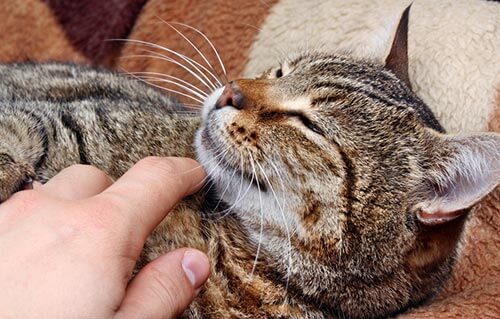
Still can’t sleep? Don’t lie awake for hours
Even if you do your bedtime routine, there may still be nights when you just can’t fall asleep easily.
It’s normal to take 20 to 30 minutes to fall asleep, but if you’re still awake after half an hour, it could be that you’re just not ready to sleep yet.
Lying awake, trying to somehow fall asleep by willpower alone, can be very frustrating and make it even harder to relax.
Instead, it might help to get up, go into another room, have dim lighting only and repeat some of your
However, if you feel that you’re wide awake, it might be better to stay up longer until you notice yourself feeling sleepy.
Just don’t lie in bed suffering in silence.
Your thoughts
Do you have a bedtime routine? Do you repeat the same activities every night, or just once in a while?
Feel free to share your ideas in the comments below.

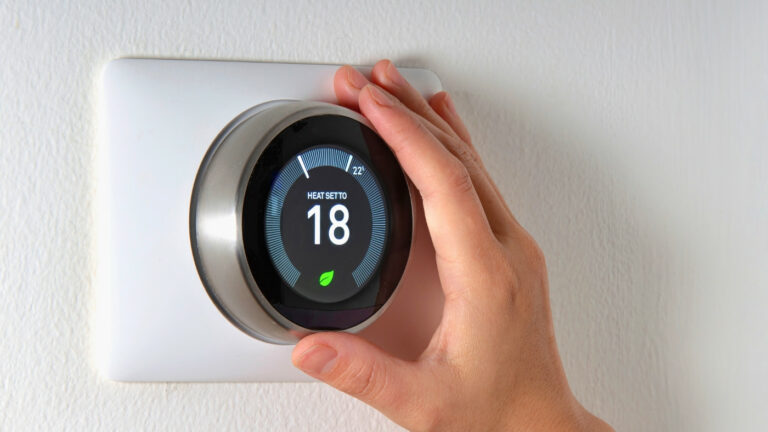
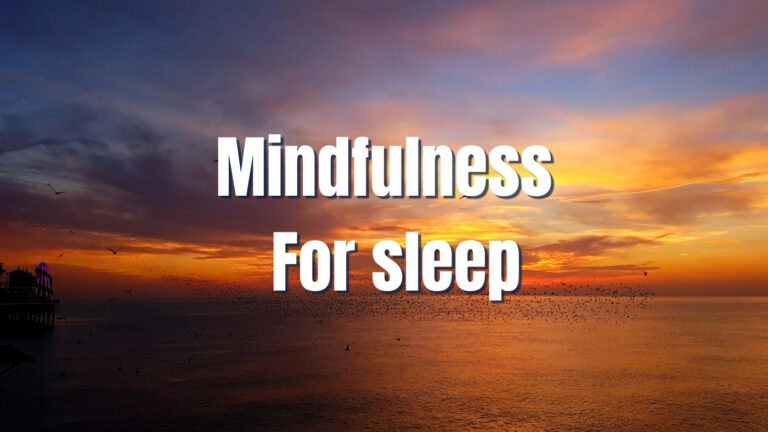


I usually have no trouble falling asleep. However, every night, like clockwork, I wake up roughly 3.5 hours later, necessitating the inevitable “Walk of Death” to the bathroom. While I always intend to go back to sleep promptly (or perhaps meditate or listen to a sleep stream on the Headspace app), the pull to check news or skim through newspapers on my iPhone/iPad often proves too tempting. Despite feeling fully awake, I recognize the importance of additional rest. Typically, I’ll find myself back in slumber after another 60 to 90 minutes. Does anyone have suggestions on how to diminish this nighttime alertness and expedite the return to sleep?
Hi Sebastian
Thanks for sharing your experience.
Out of interest, do you wake up in the morning feeling refreshed? Or do you feel tired a lot during the day?
Do you drink liquids right up until bedtime, or have a bedtime drink? Perhaps limiting your liquid intake before bed might help. Personally, I try not to have more than just a sip or two of water in the hour before bed.
I also prefer to turn my devices off completely before going to bed. I find that reduces how likely I am to use them when I wake in the night.
Regards
Ethan
My problem is not getting to sleep or staying asleep. I just don’t get to bed until after 1:00am and later still. I sleep 8-9 hours. I do not have a job, and am home alone for weeks at a time. Ideas for slowing down when the evening comes to reschedule my sleep time?
Hi Lois
It’s hard to make suggestions based on the information in your comment. I’m wondering if you fill your day with other activities that can tire you out? That would be a good starting point if you’re not working. As for the evening, I think it’s a case of following the tips in the article really, as I don’t have much to add based on your particular situation. It’s probably a case of trying some of the techniques for a couple of weeks to see if any work for you.
Regards
Ethan
When I go to sleep at night and I can hear the rain on my window, when it rains heavily and the wind is blowing in that direction, I’m a light sleeper so I can hear everything. I don’t want to put earplugs in my ears as I would hate things to get stuck in my eardrum. It’s also not comfortable either. What ideas can you suggest for this?
Hi Matthew
Thanks for your comment. Have you tried silicone or wax earplugs? They are supposed to form a seal over your ear opening, and not get stuffed inside like foam earplugs. Another alternative is some headphones and listen to music, or just use the noise cancelling if they have them. Another option is to add some extra barrier in frong of the window, such as heavy noise cancelling curtains or just very heavy curtains.
Regards
Ethan
I feel like writing down your worries for the next day before bed might bring about a bit of stress, leading to reduced quality and quantity of sleep. I could be incorrect, however, for myself I know it would.
Hi Corbin
I thanks for your comment. If you feel it would stress you out, then it’s best to listen to that. I guess it depends on what you focus on and write. I personally wouldn’t write something like “I’m worried about finishing my latest video and how long it will take to edit, and whether people will like it”. That would make me focus on the stress, as you point out. But I might write something like “To do list for tomorrow’s filming: 1. wash and iron bedding early so they are ready for filming 2. Film only introduction and section one – leave the rest till wednesday 3. Edit in the afternoon 4. Remember to stay relaxed and have fun”.
And funnily enough, point 4 is something I have written on paper and left around my home a lot, as I often forget to enjoy my work and end up getting stressed!
For me then, the idea is to write a list of things that I need to do, so I don’t go to bed thinking about them in an attempt to organise myself mentally with my eyes closed. When some key points about the day are written down, I know I can relax and just (try to) go to sleep for now.
Regards
Ethan
I think I’ll try writing my list and see if it helps. Tricking the brain into thinking that you’re organized for the next day may subconsciously allow your brain to relax and go to bed. It’s worth a try
Someone above mention that they fall asleep in 5 minutes. It seems that this may be hard for you to relate to given your response. I fall asleep in 5 minutes or less almost every night. Maybe learn from us how we did it instead of thinking its from sleep deprivation. I don’t have that condition. I just fall asleep really fast, and I know how I do it.
Hi Kathleen
Thanks for your comment, and that’s a fair point. I’d love to hear how you do it then!
Regards
Ethan
I work long hours at work really busy until 10pm, it’s a physically demanding job. Some nights I go to sleep and sleep right through until morning.
But sometimes I get home, feel like I’m wide awake, and then I don’t sleep.
So I jump in the bath to chill and relax, and sometimes rock off to sleep, but not all the time.
Hi Ellie
Thanks for your comment. Do you know if a bath or shower helps you relax and sleep better before bed? Personally, a shower works wonders, but a bath right before bed makes me too hot and then I can’t sleep because of that, even though I feel mentally relaxed.
Regards
Ethan
I’m going to try these things. My kids have rock solid bedtime routines, but I definitely think I need one, too!
I do self hypnosis every night focusing on each part of my body until I fall asleep hope this helps
Hi Brandi
Thanks for your suggestion. I like self-hypnosis too, and sometimes do a countdown along with progressive muscle relaxation.
Regards
Ethan
Dear Ethan Green,
Thanks for a well-organized, gently presented, and helpful site.
You mention spiritual practices. Christians may find the Office of Compline works very well in that category.
Hi Clair
Thank you fore your kind words – I’m glad you found the site helpful. Thanks also for your suggestion.
Regards
Ethan
This was a greatly informative article. I suffered from insomnia for 30+ years (just like my mom) and have found that as I get older and I commit to working out 5d/week (for the past 12 years) and fueling my body with proper nutrition and premium grade supplements my insomnia has gone! There is really something to be said about filling in your nutritional gaps. You talk a lot about external stimulation, and I do agree, but what about the quality of how you are fueling your body? I believe we can heal many things from the inside out. Clearly, if you have a terrible diet and you abuse your body by eating a fully processed diet your sleep is going to suffer due to deficiencies. Do you find this to be true?
Hi Tonya
Thanks for your comment and compliment. I personally definitely find that to be true. The healthier I feel in general, the better I tend to sleep. And for me, diet is a key part of feeling healthy.
Regards
Ethan
It takes most people 20-30 minutes to fall asleep? That’s insane! I do chores right up until bed, and then I pass out in less than 5min. I put my mind to work building an imaginary structure…I can’t take it and I’m out…
Hi there
I think if you fall asleep that quickly, you’re either a great sleeper or in a state of sleep deprivation. Do you feel very tired most days, or are you fine with the amount of sleep you get?
Regards
Ethan
Is an e-reader just as good as a book?
I have blue-light blocking eyewear.
Hi Corey
Yes, I think it’s fine as long as it has a blue light filter, or you use eyewear like that.
Regards
Ethan
Heavy physical exercises, no naps and being active through the day will get you to sleep immidiately.
Hi Jake
Thanks for your comment. I totally agree that doing plenty of exercise is one of the keys to better sleep!
Regards
Ethan
Your readers seem to be mostly busy professionals with a range of electronic devices but do you have any advice for older age group? I used to sleep well but find it more and more difficult to drop off. I will be 81 shortly. Drinking anything before retiring is rarely a solution for my age group due to bladder frequency.
Hi Anne
Thanks for your comment. The majority of readers probably do have lots of devices, but that’s not the only thing that can keep people awake. I think you can still put into action the other tips not related to electronic devices, and also look at the other sections such as the relaxation ideas.
Regards
Ethan
Thanks for this! I’ve been falling asleep on my couch and I’d really like to stop doing that. Great article
Hi Peol
You’re welcome – I’m glad the article was helpful.
Regards
Ethan
Great article! My ideal evening requires a nice cup of hot tea and spending a quiet moment on my balcony!
Hi Kaely
Thanks for your comment and compliment. I love the idea of spending a moment on the balcony – it’s great to get some fresh air before bed, and can be very relaxing staring up at the night sky.
Regards
Ethan
I love the tips from this article and will definitely make use of the no electronics at bed time. I think sometimes we get so caught up in our busy minds that we don’t take time out to centre ourselves and have a good sleep.
Hi Deshini
Thanks for your comment – it’s always good to know an article is appreciated:-)
Giving up electronics in bed is a great step to take – it’s not always easy, but can really help.
Regards
Ethan
Warm milk.
If you can’t sleep, watch t.v. until you are tired.
Doctor Oz, from the t.v. show, 2017, said, drink milk with a carb.
Great article
Thanks Candice!
Regards
Ethan
Great article and great tips loved it!
Hi Armando
Thanks for the comment and compliment – it’s always good to hear readers like an article.
Regards
Ethan
What do you suggest if you can go asleep when you go to bed but wake again in early hours and can’t go back to sleep?
Hi Maggie
Thanks for your comment. It kind of depends on various factors, such as how long you sleep for in total, and whether you eventually go back to sleep or not at all. Can you give me a few more details?
Regards
Ethan
Excellent post – thanks for the useful tips. I think there are a few here which can help me sleep – at least I hope so! L
Hi Liam
Thanks for your comment. I’m glad you got some useful ideas here and I hope you so sleep better!
Regards
Ethan
Love this. Thank you.
You’re welcome Melanie!
Daily meditation or mindfulness practice can help significantly with sleep problems.
Hi David
Thanks for your comment. I absolutely agree! I don’t know if you’ve seen it, but I also wrote an article specifically about mindfulness exercises for sleep that you might find interesting.
Regards
Ethan